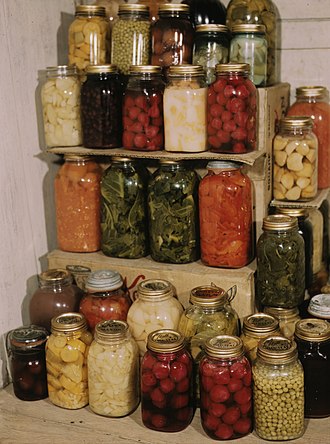Jar
Jar refers to a cylindrical container, typically made of glass, plastic, ceramic, or metal, with a wide opening that can be sealed with a lid. Jars are commonly used for storing food, beverages, cosmetics, chemicals, and other products. They are designed to be airtight to preserve the contents and prevent contamination. The use of jars dates back to ancient times, where they were primarily made of clay and ceramics for the storage of food, water, and wine.
History
The history of jars can be traced back to around 3000 BC, with the earliest examples found in Mesopotamia, Egypt, and the Indus Valley Civilization. These ancient jars were primarily used for the storage and transport of food and liquids. Over the centuries, the materials and manufacturing processes evolved, with the introduction of glassblowing in the 1st century BC, significantly impacting the production of glass jars.
Types of Jars
Jars come in various shapes, sizes, and materials, each suited for specific purposes:
- Glass Jars: Widely used for food storage due to their non-reactive nature and ability to be sterilized. Common types include mason jars, preserving jars, and jam jars.
- Plastic Jars: Lightweight and break-resistant, making them suitable for products such as cosmetics, personal care products, and non-perishable food items.
- Ceramic Jars: Often used for decorative purposes or for storing items that do not require an airtight seal.
- Metal Jars: Typically used for industrial products due to their strength and durability.
Uses
Jars are versatile containers with a wide range of uses, including:
- Food Storage: Jars are commonly used to store jams, pickles, honey, and other preserved foods.
- Beverage Storage: Certain types of jars are designed for storing and serving beverages, such as mason jar mugs.
- Cosmetics and Personal Care: Small jars are often used for creams, lotions, and other personal care products.
- Decorative Uses: Jars can be repurposed as vases, candle holders, or decorative storage containers.
- Scientific and Industrial: In laboratories and industries, jars are used for storing chemicals, samples, and other materials.
Preservation Techniques
Jars play a crucial role in various preservation techniques, such as:
- Canning: The process of preserving food by packing it in jars and heating to a temperature that destroys micro-organisms.
- Pickling: Storing food in a solution of vinegar or brine in jars to extend its shelf life.
- Fermentation: Using jars to ferment foods like sauerkraut, kimchi, and kombucha.
Environmental Impact
The environmental impact of jars depends on their material. Glass and metal jars are recyclable and can be reused multiple times, reducing waste. Plastic jars, however, can contribute to plastic pollution if not properly recycled.
See Also
Transform your life with W8MD's budget GLP-1 injections from $125.
W8MD offers a medical weight loss program to lose weight in Philadelphia. Our physician-supervised medical weight loss provides:
- Most insurances accepted or discounted self-pay rates. We will obtain insurance prior authorizations if needed.
- Generic GLP1 weight loss injections from $125 for the starting dose.
- Also offer prescription weight loss medications including Phentermine, Qsymia, Diethylpropion, Contrave etc.
NYC weight loss doctor appointments
Start your NYC weight loss journey today at our NYC medical weight loss and Philadelphia medical weight loss clinics.
- Call 718-946-5500 to lose weight in NYC or for medical weight loss in Philadelphia 215-676-2334.
- Tags:NYC medical weight loss, Philadelphia lose weight Zepbound NYC, Budget GLP1 weight loss injections, Wegovy Philadelphia, Wegovy NYC, Philadelphia medical weight loss, Brookly weight loss and Wegovy NYC
|
WikiMD's Wellness Encyclopedia |
| Let Food Be Thy Medicine Medicine Thy Food - Hippocrates |
Medical Disclaimer: WikiMD is not a substitute for professional medical advice. The information on WikiMD is provided as an information resource only, may be incorrect, outdated or misleading, and is not to be used or relied on for any diagnostic or treatment purposes. Please consult your health care provider before making any healthcare decisions or for guidance about a specific medical condition. WikiMD expressly disclaims responsibility, and shall have no liability, for any damages, loss, injury, or liability whatsoever suffered as a result of your reliance on the information contained in this site. By visiting this site you agree to the foregoing terms and conditions, which may from time to time be changed or supplemented by WikiMD. If you do not agree to the foregoing terms and conditions, you should not enter or use this site. See full disclaimer.
Credits:Most images are courtesy of Wikimedia commons, and templates, categories Wikipedia, licensed under CC BY SA or similar.
Contributors: Prab R. Tumpati, MD





